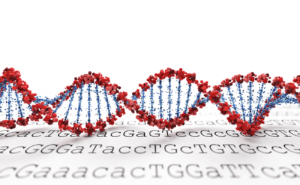
When pregnant or planning for pregnancy, genetic testing is available for certain inherited conditions. Even people with no family health history of birth defects or problems with development may want to consider one type of genetic testing called carrier testing.
What is carrier testing?
Most babies are healthy, but about 3-5% have some type of birth defect or problem with development. Some inherited conditions result from genes that are hidden in the family, so even people with no family health history of serious health problems can still have a chance to have a baby with an inherited condition. Genes are made up of DNA, the blueprint that determines how a body grows, develops, and functions. Genes are passed from one generation to the next in a family. Sometimes there is a difference in a gene called a DNA variant, which causes the gene to not work properly. In some inherited conditions, if a person has one non-working copy of the gene, she is called a carrier. Most carriers are healthy and would therefore never know that they are carriers. Carrier testing looks at people’s DNA to find out if they are carriers.
Who should have carrier testing?
Some people think that as long as they don’t have any family health history of birth defects or inherited disease, their children won’t either. Unfortunately, even healthy parents with healthy families can have children with inherited conditions. Therefore, anyone who is pregnant or planning for pregnancy could consider carrier testing. The American College of Obstetricians and Gynecologists (ACOG) supports this type of testing. Not all prenatal or fertility care providers offer carrier testing, so some people will need to ask for carrier testing if they want it.
What happens if someone is a carrier for an inherited condition and is pregnant or planning for pregnancy?
There are two different types of inherited conditions that are included in carrier testing. The first type is autosomal recessive. Genes are located on chromosomes, and most people have 46 chromosomes, or 23 pairs. In each pair, one chromosome is from the mother and one is from the father. If both parents are carriers for a condition, there is a 1 in 4 chance that a child could inherit two non-working copies of the genes and therefore have the condition.

The other type of inherited condition included on some carrier screening tests is X-linked recessive. The 23rd pair of chromosomes are the sex chromosomes. Females typically have two X chromosomes and males have one X and one Y chromosome. Some genes are on the X chromosome. If a male inherits a non-working copy of a gene on the X chromosome, he will likely have the condition. However, a woman who has one working copy of the gene and one non-working copy of the gene is a carrier and is usually healthy. If a woman is a carrier of an X-linked recessive condition, she has a 1 in 4 chance to have an affected son.

If people are planning for pregnancy and know that their child would be at risk for an inherited condition, they have a few options. They can consider in vitro fertilization (IVF) and testing embryos, use a donor egg or sperm, or test a pregnancy. Others may even decide to adopt or not to have children. Either way, the earlier they understand the risks, the more choices available to them.
Which carrier test is best for people who are pregnant or planning for pregnancy?
Labs now offer different forms of carrier testing. Some of these tests include over 250 different conditions and are called expanded carrier screening tests. Others are focused on a small number of diseases based on the person’s ethnic background or even on a specific disease that runs in a family. ACOG recommends that all pregnant women be offered carrier screening for cystic fibrosis ( an inherited lung disease), spinal muscular atrophy (a progressive nerve disorder), and hemoglobinopathies ( a blood disorder). ACOG also supports expanded carrier screening and encourages people to have carrier testing prior to pregnancy. The Pregnancy Planning Family Screen from Mainstream Genomics is a starting place for parents-to-be to assess the health of their families and decide whether carrier testing is right for them.


How do people who are pregnant or planning for pregnancy get carrier testing?
There are a few options for ordering carrier testing. A physician can order carrier testing. However, many healthcare providers are not familiar with all the different types of carrier testing, or they may only offer carrier testing during pregnancy. A genetic counselor, who is specially trained in genetics and is shown to be more familiar with genetic risks and genetic testing, can help coordinate carrier testing for people and their healthcare professionals. Using the expertise of genetic counselors, Mainstream Genomics offers a service to help people who are planning for pregnancy determine which genetic services are best for them.
Some laboratories also allow people to order carrier testing online by connecting them to physicians online. Many of these online services include an optional but free conversation with a certified genetic counselor. To help determine which carrier testing to order, Mainstream Genomics’ Pregnancy Planning Family Screen collects family health history and provides a Personalized Screening Plan with any suggestions from a genetic counselor for genetic testing. Some carrier testing is available to people without a doctor’s order, but the FDA does not advise using them for medical purposes. These tests can be fun but may not include the same conditions as physician-ordered tests. They also may miss some carriers that the physician-ordered tests would find.
Does insurance cover carrier testing?
Some insurance policies will cover carrier testing. Some policies will only cover carrier testing during pregnancy, but a woman or couple has fewer options at that time. Others will only cover carrier testing for a condition that is known in the family or recommended by medical associations for certain ethnic groups.
How much do carrier tests cost?
Some labs offer carrier testing for a cash rate of $250 for the woman and $100 for her partner. Some couples start with one partner and only pursue testing for the other partner if the first partner is found to be a carrier for an inherited condition. The cost billed to an insurance company can vary.
Elizabeth Kearney, MS, CGC, MBA
Licensed Genetic Counselor
